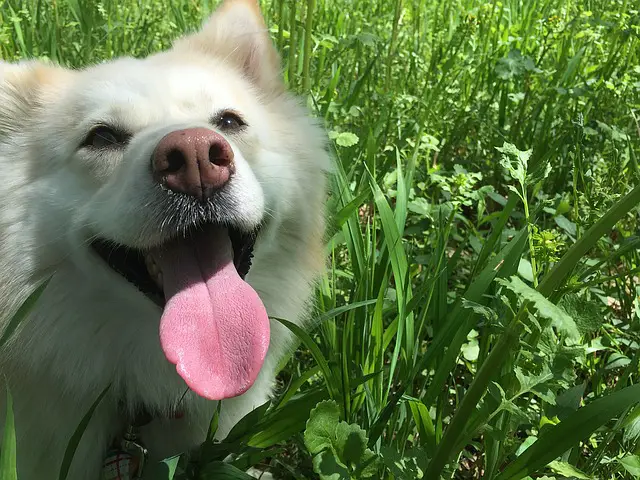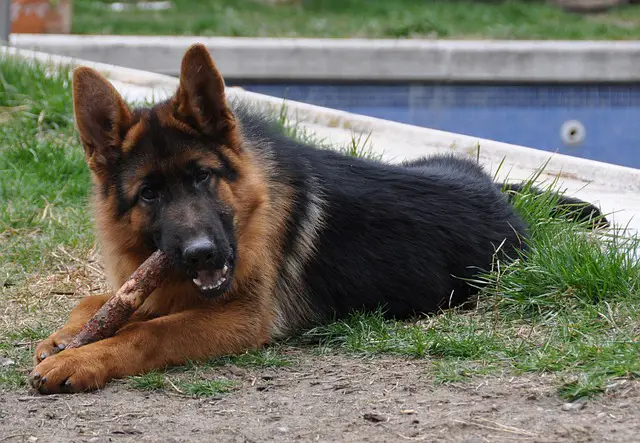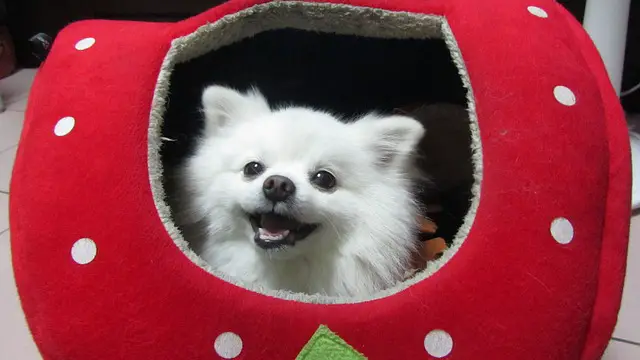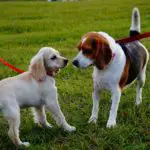Are you wondering ‘why does my dogs breath smell like poop?’
Naturally it can be a cause for concern. Often, dog breath that stinks like feces could be attributed to lack of oral hygiene but in some cases – things may not be as straightforward.
In this article, you will discover:
- 7 Tips that can help you treat dog’s breath that smells like poop
- 12 Reasons why your dog’s breath might smell like poop
- And more…
Why Does My Dogs Breath Smell Like Poop?
Your dog’s breath might smell like poop due to lack of oral hygiene or dental disease. Sometimes, dog’s bad breath can also have underlying medical issues like diabetes, kidney or liver disease, poop-eating habit, etc. Consumption of something toxic, gastric issues, and sinus infections could also be the culprits.
Let us dive deeper into this.
12 Reasons Why Does My Dogs Breath Smell Like Poop?

Dog’s breath smell like potty can be attributed to the following reasons:
1. Lack of oral hygiene
Dr. Alana Biggers, MD attributes a lack of oral hygiene to feces-like breath in humans but the same fact can be applied to dogs.
Many dog owners do not give too much importance to their dog’s oral hygiene. This, overtime, can lead to the accumulation of plaque and tartar on the teeth and gums.
Dogs that eat wet or soft food are usually more susceptible to plaque/tartar accumulation. The wet food sits on the teeth and gums and decays over time. Bacteria accumulate in the decaying food which, in turn, results in inflammation and irritation. According to Dr. Anton C. Beynen, these bacteria These bacteria start producing volatile sulfur compounds that lead to the offensive smell.
Once irritation and inflammation sets in, your pet’s oral health is compromised and not only does it have bad sewer-like breath, it could also experience pain, difficulty eating, and even loss of teeth.
When your dog’s mouth is chronically diseased, there is also a risk that the inflammation could spread to other parts of its body. The toxins from its saliva can get absorbed into the blood stream eventually affecting the heart, kidneys, and even the brain.
2. Dental Decay/Periodontal disease
Dr. Joel Stone, a leading expert on pet dental disease, attributes poop-like bad dog breath to dentaldisease. He states that nearly 80% of dogs developdental disease, gingivitis,or periodontal diseases by the age of three.
These conditions can all cause a dog’s mouth to stink like poop. The poop-breath, says Dr. Stone, is a clear indication of rotting or decaying teeth.
In addition to malodor, your poor pet might show many other signs of rotting teeth: shying away from being touched on the mouth, gingerly picking up food with difficulty, ropey or bloody saliva, and excessive drooling or dribbling.
Please do not ignore these signs and have your buddy examined by your vet.
3. Diabetes
If your dog does not have gum disease, periodontal disease, or dental decay, then its poop-like breath could be due to a serious underlying medical issue like diabetes.
If your pet has diabetes, then its high blood sugar levels increase the glucose in its saliva. This glucose feeds the bacteria that are present in the food left behind in the oral cavity. This can lead to plaque formation and halitosis or bad breath.
Furthermore, dogs with diabetes have ketones formed as a result of higher insulin resistance. These ketones also lead to a foul breath.
4. Kidney disease
According to AKC, stinky dog breath can also be caused by failing kidneys. In this case, your dog’s breath might acquire a urine-like odor since the kidneys are unable to filter out the waste. You might also notice other symptoms like pale gums, chemical-like breath odor, weight loss, and lethargy.
It is best to have your veterinarian evaluate the condition so you can start the treatment right away.
5. Liver disease
The AKC also attributes liver disease as one of the leading causes of dog’s breath smelling like poop.
Other symptoms in canine liver disease include vomiting, yellowish gums, lack of appetite, and a truly foul mouth odor. Please have your dog examined by your vet as soon as possible.
6. Behavioral disorders and unpleasant dietary habits
Dr. Nicholas Dodman of Tender Care Animal Hospital states that corpophagia or poop-eating habit in young puppies (and a few adult dogs) can also contribute to poop-like breath in dogs.
If an unsupervised puppy’s breath constantly smells like feces, then chances are that it could be eating its own feces or other dog’s feces. Some nursing bitches are also known to indulge in corpophagia.
You can take many steps to prevent it such as crating your dog or simply ensuring that it does not have access to dog feces (its own and other dogs’).
Other behavioral issues like trash-eating or picking decaying food stuff off the road can also cause poop smell or stinky breath in your pooch. Thankfully, a responsible dog owner can prevent these causes.
Also Read: 11 Reasons Why Your Dog Has Fishy Smell (#3 is Surprising!)
7. Food intolerance/poor-quality food
Dr. Troy Jones of Jones Veterinary Hospital believes that some commercial dog foods – which are themselves so foul smelling – can also be the culprit behind foul doggy breath.
Poor quality foods, says Dr. Jones, not only lead to food intolerances and food allergies in sensitive dogs; they are also more likely to cause accumulation of food in the teeth.
All these can contribute to issues like dental disease, poor or dull coat, bad breath, skin problems, halitosis, and even anal gland issues in dogs.
Find out: 8 Stunning Reasons Why Your Dog in Pain After Anal Glands Expressed
8. Poor gut microbiome
There is no doubt that there is a relation between thebreath and gut health. This isn’t just true for humans; it is also applicable to our dogs.
The experts at Eldorado Animal Clinic agree.
They believe that balanced microbiomes are necessary to maintain a dog’s ‘natural doggy breath’. If there is too much bad bacterium in the dog’s gut, then its breath is bound to smell foul. Normal doggy breath isn’t foul at all and all healthy dogs are meant to have a characteristic doggy breath.
However, trouble arises when the dog’s breath turns fishy, poop-like, metallic, urine-like, or simply like rotting and decaying matter.
Poor gut health causes foul gas to get trapped in the gut. Over time, ittends to get absorbed into the bloodstream.This undigested food in the intestine re-releases the trapped gases and stomach acids back into the mouth causing a foul stench.
Often, poor quality foods are responsible for poor gut microbiome although some underlying health issues can also be the culprits.
9. Oral tumors
Canine oral tumors can also cause an influx of bad bacteria that can make the dog’s breath smell like poop, garbage, or sewers.
The tumors tend to bleed resulting in a metallic smell caused by the iron in the blood.
Typically, environmental and genetic issues contribute to oral tumors in dogs and several dog breeds like Boxers, German shepherd, Chow chow, and Pointer breeds are more susceptible to them.
Signs of oral tumors include cauliflower-like growths on the gums that can even invade the bone underneath. These ulcerated tumors burst releasing a foul odor in the process.
10. Consumption of toxic plants
An upset tummy could drive your dog to eat grass, but in the process it could eat plants that may be toxic to it.Many plants which humans can safely eat are toxic to dogs.
Dogs with pica (a condition where they eat anything and especially things they aren’t supposed to eat) can all result in a bad breath.
As a dog owner, it is important to keep an eye on what your dog eats and also know the list of plants toxic to dogsto remove from your yard.
According to ASPCA, here are some common plants that are toxic to dogs:
- Tomato plant
- Aloe Vera
- Daffodil
- Baby’s Breath
- Amaryllis
- and many more…
11. Sinus infections
Just as people with blocked sinuses tend to have a foul breath, so do dogs.
Dr. David Harris BVSc attributes nasal disease, respiratory tract diseases, sinusitis, and nasal tumors to foul-smelling doggy breath. He explains that the pus caused by decaying white blood cells tend to trickle into the throat which can cause foul smell or poop-like smell in dogs’ breath.
In addition to bad breath, if your dog shows other symptoms like sneezing, nasal discharge, nasal bleeding, eye discharge, or difficulty in breathing, please have your vet look at it right away.
12. Bowel Obstruction/Gastrointestinal issues
In humans, acid reflux and GERD can cause a back-flow of acid into the esophagus. This results in the patient’s breath smelling like poop.
Dr. David Harris believes that the same is true in dogs. Conditions like bowel obstruction, intestinal blockage, GERD, gastritis, and other canine gastrointestinal diseases can all cause food to pool in the stomach. Over time, the trapped gases can escape into the dog’s mouth resulting in very foul breath.
Symptoms of intestinal blockage in dogs include repetitive vomiting (which too can cause stinky breath), lethargy, appetite changes, and abdominal pain accompanied by hunching and whining. Please have your dog examined by your vet if these symptoms persist.
7 Tips for Treating & Preventing Poop Breath in Your Dog

Now that you know the causes behind why does my dogs breath smell like poop, here are some ways to treat it:
1. Pay attention to its oral hygiene
The best thing to do if your dog’s poop breath stems from plaque and tartar formation, is to clean its teeth regularly. Make brushing a part of your dog’s daily routine. You can use a high-quality dog toothpaste and brush for the same.
Only use dog toothpaste – never use human toothpaste for the job.
Smaller breeds like Chihuahuas need even greater dental care as they are prone to dental issues and cavities.
If the plaque is hardened and does not come off with brushing alone, you might want to schedule an appointment for dental scaling at your vet’s clinic.
Dental scaling needs anesthesia so your vet might runs some blood tests to ensure that your dog can handle it.
If needed, the veterinary dentist might even remove some of the loose, broke and decaying teeth, to prevent recurring halitosis.
Also Read: 12 Common Health Issues in Chihuahuas (With Tips for Prevention)
2. Provide your pet with dental chews and chew toys
Dental chews are known to remove tartar and plaque and are even help freshen up doggy breath. These are not an alternative to regular brushing but can be used in addition to it to maintain your dog’s oral hygiene.
You can also provide your dog with dental chew toys as their texture helps remove tartar buildup and can also entertain your pet.
Many dental chews, dental sticks, and chew or rope toys available in the market can not only treat bad breath in dogs; they can also prevent it.
3. Curb unsupervised snacking
If your pet has the habit of eating from trash cans or picks up food from the road during walks, you might want to curb this behavior.
Keep trash cans tightly sealed and prevent corpophagia by picking up dog feces from the yard.
You can also add certain additives like meat tenderizers and pumpkin to dog’s food to prevent corpophagia. These foods taste great but they make the poop smell and taste bad – so your dog is repulsed from eating it.
Place your cat’s litter box out of reach too in case your dog eats cat feces.
If your puppy eats feces, crate it or hire a pet-sitter to supervise it and prevent poop eating when you are away.
4. Treat underlying health issues
Diseases like kidney, liver disease, and diabetes need medical treatment. If they are the culprits behind your dog’s poop breath, then please consult your veterinarian.
Once your dog gets appropriate treatment, it will feel better and its poop breath should also get resolved.
5. Use dental additives in your dog’s drinking water
Adding dental additives to your dog’s drinking water can help prevent poop breath in dogs and also keep your its teeth and gums healthy. It can even reduce plaque and tartar formation.
6. Make dietary changes
Feed your dog a balanced diet. Select high-quality kibble instead of wet or soft food as the crunchy texture can reduce plaque formation. If needed, seek help of your veterinarian in selecting good dog food. This can prevent food intolerances and health issues that arise with it.
Look for foods with probiotics and prebiotics that can help balance gut microflora. Limit the amount of carbohydrates your dog eats since a dog mainly needs protein in its diet.
You can add complex and healthy carbs like brown rice, sweet potatoes, and pumpkins which also provide vitamins and minerals and improve dog’s overall health.
It is a good idea to provide your dog with some crunchy foods like carrots and apples as their texture can prevent food from sticking to the gums and teeth and freshen up its breath.
Schedule regular vet checkups so you know your dog is getting all the right nutrition that it needs.
Be careful when feeding human foods as many are toxic and unacceptable to dogs.
7. Use herbs
You can provide certain herbs like mint, cilantro, parsley, and sage to promote fresh breath in your dog. Many of these aromatic herbs are readily available in the market and you can add them over your dog’s food or simply give it to your dog to chew. Some of these herbs have antiseptic properties and some even improve dog’s digestive health.
Always consult your veterinarian before making drastic dietary changes or using dental products for your dog’s poop breath.


